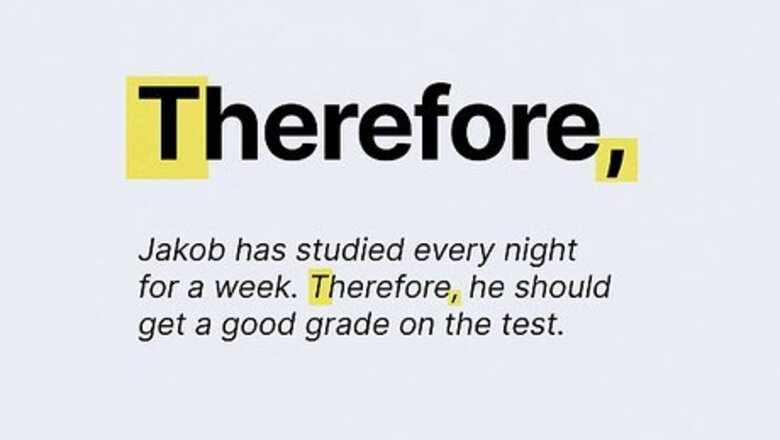
views
- Use "therefore" to show that the second thing you're talking about happened because the first thing happened.
- Place a comma after "therefore" when using it as an introductory phrase or a conjunctive adverb.
- Place a semicolon before "therefore" and a comma afterward when combining 2 independent clauses into a single sentence.
- Include "therefore" sparingly in formal writing.
Punctuation and Capitalization
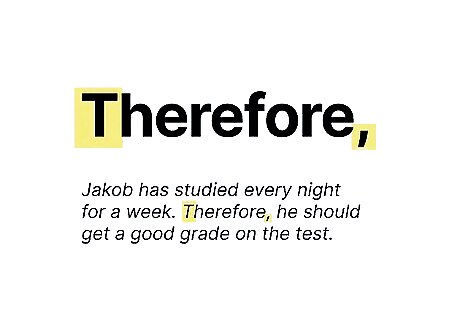
Capitalize "therefore" and follow it with a comma if it starts a sentence. This one's pretty easy to remember, because you always capitalize the first word of a sentence. This is the only time you need to capitalize "therefore." Since it's an introductory phrase, it's also followed with a comma. Here are a couple of examples: The last bus doesn't arrive until 8:45 at the earliest. Therefore, school doesn't start until 9. Jakob has studied every night for a week. Therefore, he should get a good grade on the test.
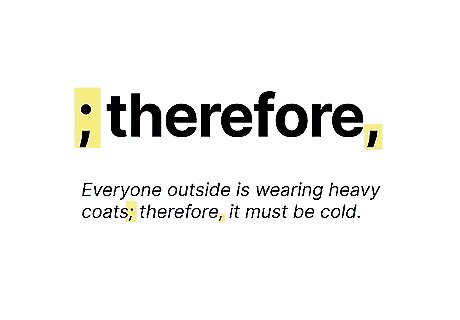
Combine sentences with a semicolon and "therefore." Instead of writing 2 sentences separately, you can use "therefore" to put them together—but it needs a semicolon to help out. Since "therefore" is still an adverb, it can't join sentences all by itself. You'll also put a comma after "therefore," since it introduces the 2nd sentence. You can see how this works in the following examples: Aria practiced all summer; therefore, she should make the team. School is closed today; therefore, the kids are sleeping in. Everyone outside is wearing heavy coats; therefore, it must be cold.
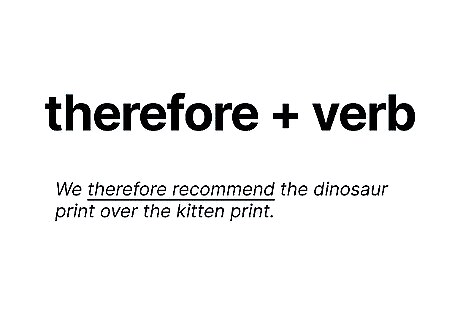
Leave out punctuation entirely when using "therefore" as an adverb. When "therefore" comes directly before the verb it modifies, you don't need any punctuation at all. Here, you treat "therefore" just like any other adverb. For example, you might write, "We therefore recommend the dinosaur print over the kitten print." Some style guides will tell you to set off "therefore" with commas when you use it this way. But many writers still leave those commas out if they feel like they disrupt the natural flow of the writing.
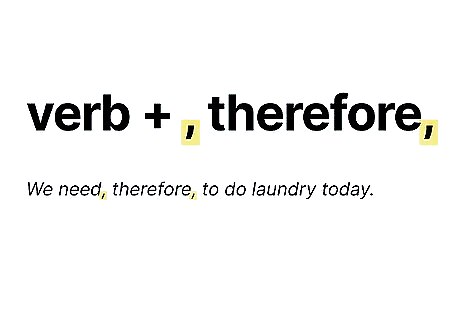
Set off "therefore" with commas if it's an interrupter. This isn't a super-common usage of therefore, but it's still one you need to be aware of. Generally, "therefore" is an interrupter if it comes after the verb in the sentence. Here are some examples: I would, therefore, like a response. We need, therefore, to do laundry today. The cats need, therefore, to stay indoors.
Common Uses of "Therefore"
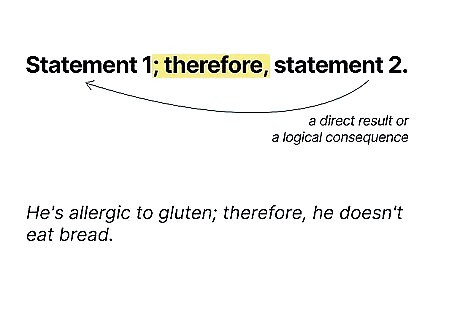
Show a cause-and-effect relationship between 2 statements. In the most basic use of "therefore," the word means that the 2nd thing you've mentioned happened as a direct result of or as a logical consequence of the 1st thing you mention. Just make sure the 2 things have a direct relationship. This is easy to see with a few examples: Dakota studied hard for their math exam; therefore, they got an A+. He's allergic to gluten; therefore, he doesn't eat bread. Cats have free-floating collarbones; therefore, they can squeeze into tight places.
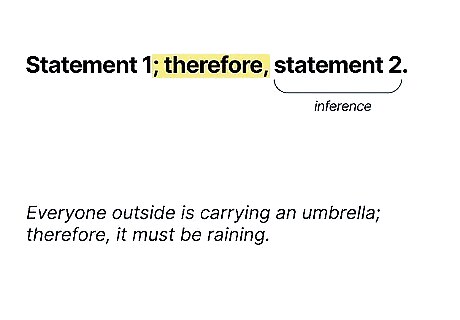
Introduce an inference you're making based on an observation. Here, you don't actually know the relationship between the 2 statements, you're just inferring the second thing based on the first. In addition to the word "therefore," you'll typically use conditional language in the 2nd statement so your reader understands that it's an inference you're making, not a fact. Here are some examples: Everyone outside is carrying an umbrella; therefore, it must be raining. My cats are all meowing in the kitchen; therefore, I should probably feed them. Parker listens to a lot of pop music; therefore, she would like Taylor Swift.
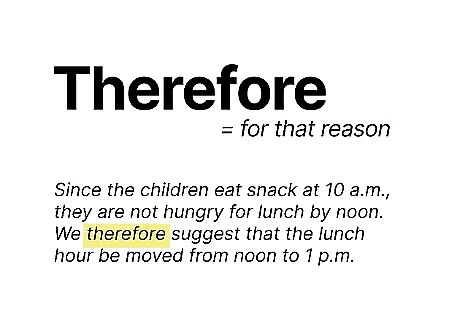
Use "therefore" as an adverb meaning "for that reason." The word "therefore" is a conjunctive adverb that more frequently finds itself in the conjunctive role of joining 2 thoughts together. But it can also modify verbs all by itself. This usage is most frequent when you have talked about multiple reasons for something and are wrapping things up. Some examples can help clarify this for you: Since the children eat snack at 10 a.m., they are not hungry for lunch by noon. We therefore suggest that the lunch hour be moved from noon to 1 p.m. If students don't agree to participate in the learning process, teachers accomplish very little. Teachers are therefore highly dependent on their students to be engaged. Studies show young animals are more receptive to other species. Dogs and cats are therefore more likely to get along if they're introduced to each other when they're young.
Avoiding Common Errors
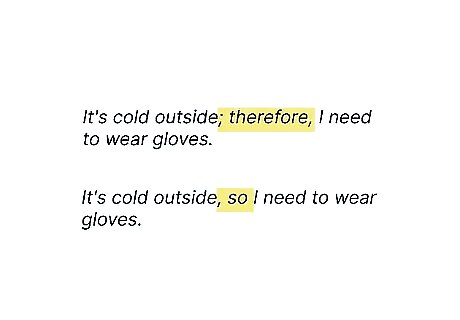
Distinguish between "therefore" and coordinating conjunctions. It's easy to confuse "therefore" with coordinating conjunctions, such as "so." Often, when you use "therefore" in the middle of a sentence, a coordinating conjunction would actually work better. If you do stick with "therefore," though, it needs a semicolon. For example, "It's cold outside; therefore, I need to wear gloves" could also be written as "It's cold outside, so I need to wear gloves."
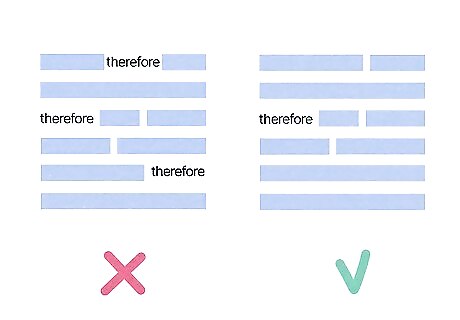
Vary your writing with different transitions and sentence structures. "Therefore" is a word that's best used sparingly. More than once in a paragraph will feel repetitive. There are many different words, including "thus," "consequently," and "accordingly," that have similar meanings. Be careful with the meaning of the transitions you use. Remember that "therefore" means "because of" or "as a logical consequence of." If your use of "therefore" is getting repetitive, replace it with words that have the same meaning. You can also flip a sentence around to vary your sentence structure. For example, instead of "It's cold out; therefore, I'm wearing gloves," you might say "I'm wearing gloves because it's cold out."
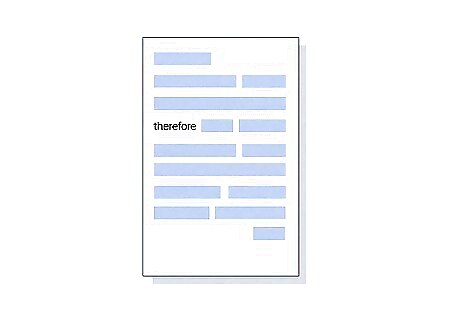
Save "therefore" for more formal writing. "Therefore" is a pretty fancy word that comes across rather stilted in normal conversation. The same person who uses it frequently in academic writing would be unlikely to use it while chatting with friends. Make sure you understand how formal your writing should be. Overly formal expressions can make you sound fake and distract your reader from the point you're trying to make.




















Comments
0 comment